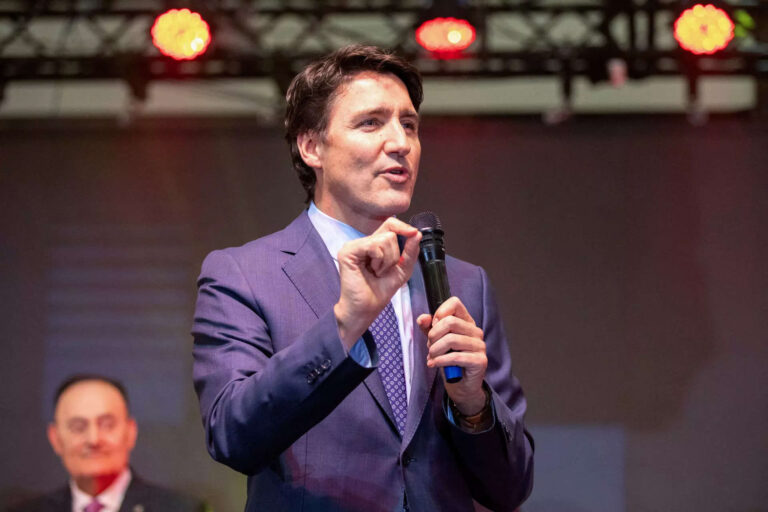
[ad_1]
The Federal Court of Canada has delivered a stern rebuke to Prime Minister Justin Trudeau‘s administration, deeming the use of emergency powers to suppress the “freedom convoy” protests in 2022 as unjustified and disproportionate. Justice Richard Mosley highlighted that the situation, though urgent, could have been managed with existing laws.
What they are saying
What they are saying
- “I conclude that there was no national emergency justifying the invocation of the Emergencies Act and the decision to do so was therefore unreasonable and ultra vires,” Federal Court Justice Richard Mosley wrote in the Tuesday decision, using the Latin for acting “beyond one’s powers.”
- The ruling from the Federal Court of Canada also determined that the act of freezing bank accounts associated with individuals involved in the protest was likewise unwarranted.
- “The harassment of residents, workers and business owners in downtown Ottawa and the general infringement of the right to peaceful enjoyment of public spaces there, while highly objectionable, did not amount to serious violence or threats of serious violence,” the judge wrote.
- Pierre Poilievre, heading the Conservative opposition and known for delivering coffee and doughnuts to the demonstrators amid the blockade, criticized Trudeau on X. He accused, writing that Trudeau “broke the highest law in the land with the Emergencies Act.”
- “He caused the crisis by dividing people. Then he violated Charter rights to illegally suppress citizens. As PM, I will unite our country for freedom,” Poilievre said.
- This decision casts a shadow on Trudeau’s government, which defended the use of the Emergencies Act as a necessary response to the protests against Covid-19 mandates.
What’s happened during Freedom Convoy protests
- The Freedom Convoy protests shook Canada’s reputation for civility. In early 2022, the “Freedom Convoy” demonstrations brought Ottawa to a standstill and choked off key border crossings, protesting against stringent public health mandates, including vaccine requirements. Prime Minister Justin Trudeau, facing a national deadlock, labeled the deployment of emergency powers as essential, citing the protestors’ non-negotiable stance.
- Sweeping powers unleashed: The activation of the Emergencies Act handed law enforcement sweeping authorities. Police received a green light to disperse and detain demonstrators, the government gained the capability to freeze financial assets tied to the protests, and even tow trucks could be commandeered to clear blockades, showcasing an unprecedented governmental response to civil unrest.
- Legal challenge and precedent: The Canadian Civil Liberties Association, alongside the Canadian Constitution Foundation and affected individuals, spearheaded a legal battle against Trudeau’s government. The Federal Court’s judgment now emerges as a defining moment, setting a stringent benchmark for the future invocation of emergency laws. The Canadian Civil Liberties Association hailed the ruling as a landmark, ensuring that every successor government treads cautiously when considering such drastic measures.
- The truckers’ protest, aiming initially at Covid-19 vaccine mandates, grew into a significant movement, challenging not only health policies but also the Trudeau government’s approach to dissent. The Freedom Convoy resonated internationally, sparking movements in various countries and causing substantial economic disruptions, notably at the Windsor-Detroit border crossing, a critical trade artery.
A tale of two protests
- In a striking contrast, Trudeau, who showed a heavy hand in dealing with domestic protests, voiced concern over India’s handling of the farmers’ protests.
- “Let me remind you, Canada will always be there to defend the right of peaceful protest. We believe in importance of dialogue and that is why we have reached out through multiple means directly to Indian authorities to highlight our concerns,” Trudeau had said while addressing an online event on Indian community in December 2020.
- India, on its part, escalated its response by summoning the Canadian ambassador, expressing its discontent over Trudeau’s remarks on the farmer protests near Delhi. New Delhi labeled Trudeau’s comments as an unwarranted intrusion into its internal matters, cautioning that such statements threaten to significantly strain
India-Canada relations . - His advocacy for peaceful protest rights and dialogue when addressing the Indian community in Canada starkly contrasts his government’s aggressive stance against the “freedom convoy.”
- Trudeau evidently placed a higher premium on currying favour with this domestic constituency than on relations with India.
- India’s sharp response, citing Trudeau’s comments as interference, spotlights the delicate balance between domestic governance and international diplomacy.
Canada’s reputation at stake
- As Trudeau’s government faces legal scrutiny at home and diplomatic tensions abroad, the Federal Court’s ruling serves as a critical juncture, questioning the consistency and integrity of its approach to civil liberties and protest.
- The unfolding events will not only shape Canada’s internal legal landscape but also its international image and relations, especially with countries like India.
- Canada’s Prime Minister
Justin Trudeau ‘s allegations in September, linking Indian officials to the assassination of Hardeep Singh Nijjar in British Columbia, have already ignited a significant diplomatic discord. - Canada had to withdraw a substantial portion of its diplomatic workforce from India in October, extracting 41 diplomats on New Delhi’s behest.
- This diplomatic rift has manifested in a sharp decline in the issuance of study permits to Indian students. Official records, not previously disclosed, reveal an alarming over 80% drop in study permits for Indians during October and November of the previous year, compared to the initial two months of the third quarter, signaling a profound disruption in educational and cultural exchanges.
(With inputs from agencies)
[ad_2]
Source link
